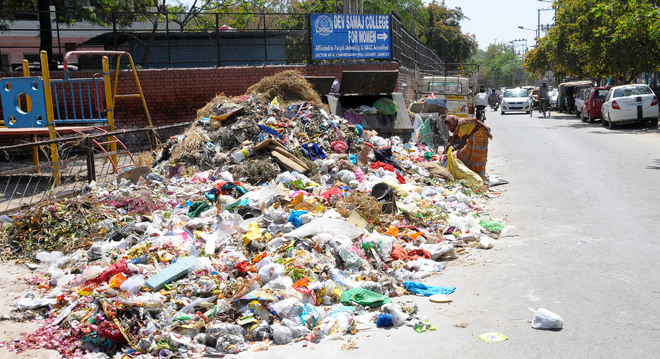Rajinder Nagarkoti
Tribune News Service
Chandigarh, August 10
The slip in the city’s ranking from the top to 21 in the Swachh Bharat Abhiyan has raised question on the solid waste management system of the City Beautiful. The performance was judged 10 months after Prime Minister Narendra Modi kicked off the Swachh Bharat Abhiyan.
The survey conducted during 2014-15 was commissioned by the Ministry of Urban Development as required under the National Sanitation Policy of 2008.
Over all, the sanitation rankings of these cities based on a total of 100 marks and on different parameters covering all aspects will be announced later. The Swachh Bharat rankings are based on a total of 42 marks, including 20 for open defecation indicators and 22 for solid waste management indicators.
Chandigarh Tribune takes a look on the reasons why the city slipped in Swach Bharat ranking.
Mc failed to keep city clean
The Municipal Corporation spends crores of rupees on the purchase of garbage-lifting vehicles, garbage bins, and rehris, but it has miserably failed to put in place the basic mechanism for the collection and segregation of garbage at the household level and at Sehaj Safai Kendras (SSKs). As there is no mechanism for the segregation of garbage, neither at the household level nor at the MC level, the garbage, which can be recycled after proper segregation, is being dumped in open spaces.
Similarly, bio-medical waste management is also not effective in the city.
Civic body’s failed projects
Coloured bins
The Chandigarh Pollution Control Committee and the UT Administration issued directions that coloured bins should be installed in vegetable and meat markets so that the segregation of garbage could be done at the markets itself. The coloured bins were placed in the markets, but good response was not received from the residents.
Door-to-door collection of segregated garbage
The project was launched by the UT in 2001. NGOs and the Residents’ Welfare Associations were involved in the project. The contractor had to collect the garbage in specially designed rickshaws with two separate bins. The project did not take off.
Sehaj Safai Kendras
The MC started the project in 2002 and proposed the setting up of 132 such centres in different sectors. The proposal involved the segregation of garbage collected from houses at the centres, where coloured bins were to be installed. The authorities had decided that special provisions would be made for domestic-hazard waste. No provision has yet been made for the segregation of garbage at these centres, which have become mere collection centres, from where the garbage is sent to the garbage-processing plant at Dadu Majra.
Pilot project failed to take off
A pilot project started by the MC for the collection of garbage in Sector 22 last year failed soon after its launch. Under the pilot project, the MC hired a contractor for garbage collection. The rates were fixed for the door-to-door collection of garbage. After protests by sanitation workers and political interference, the project was scrapped.
25% waste dumped without processing
The city generates 350-400 tonnes of municipal solid waste daily that is managed by the Municipal Corporation. There is one garbage processing plant in Dadu Majra, which, at present, is processing approximately 75 per cent of the garbage while the rest is being dumped at the dumping ground without processing.
Unlock Exclusive Insights with The Tribune Premium
Take your experience further with Premium access.
Thought-provoking Opinions, Expert Analysis, In-depth Insights and other Member Only Benefits
Already a Member? Sign In Now











